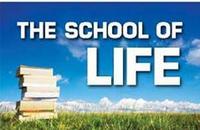The School of Life
Education is the process of interaction and feedback we receive from our environment. Kabbalah teaches us how to harness the power of our environment to educate us in this changing world.
How far back into your childhood can you remember? If you’re like me, maybe those first memories surface around age 4 or 5. Those who have a clearer vision, or who have had the chance to watch a child of their own, are privy to a wondrous transformation that is played out each and every day. We all start life with just a few instinctive skills – how to suckle, grasp a finger, or wail in discomfort. All of our needs are instantly provided for by our doting parents.
Soon, however, we start learning how to manipulate our environment. Maybe that cute grimace on our face always elicits a laugh from Mother, so we naturally try to repeat it. We discover that chewing the rattle feels good on our gums, so we start working on how to get the rattle in our mouth instead of poking ourselves in the eyes with it. Virtually every waking moment, an infant’s mind is forging new connections about how its body and the surrounding world function and interact.
As we grow into childhood, we keep expanding our horizons, assessing each new situation to determine how to get the most pleasure possible while expending the least amount of effort to get it. This is as natural for us as breathing, and the world gives us instant feedback to help us make adjustments. What little girl has not learned by age 6 that looking at dear old Dad with big eyes and saying “Pleeeeease!” will most likely get her what she wants? How many little boys find out the hard way that picking on the biggest, toughest kid in the class is bound to have bad results?
Enter the Classroom
The particular circumstances that work or don’t work for us in our environment shape our behavior and our future with a force that is almost impossible to break later in life. Yet this powerful and inevitable force is not what we mean when we talk about “education.” Instead, we use the term to refer to a collection of facts, skills and ideas that are imposed on us by some outside authority. Realistically, virtually all of this “formal education” is lost almost as soon as the child leaves the classroom. How many of you can rattle off the names of the Presidents or the capitols of all 50 states? Can you solve a polynomial equation, or remember the difference between ionic and covalent bonds?
Our focus on an education based on facts and figures has several unfortunate consequences. For many people, the process is so painful that it creates a lifelong aversion to learning. Many people can’t wait to graduate and learn their basic job skills so that they can be finished with “education.” Life changes that require the acquisition of new skills are then extremely traumatic, rather than being simply a new stage in life.
Where “Education” Fails Us
Probably more critical, though, is that our focus on classroom learning numbs us to the true education that is available to us through our own personal exploration of the world. Unconsciously, we are all influenced by our environment. We react and make adjustments based on whether our actions bring us pleasure or pain. Each time our environment changes, whether it is as simple as meeting a new friend or as life changing as marriage, a new job, or a move, we must learn new “rules” of behavior and adjust to the changing circumstances. But imagine the power that would be at our fingertips if we were taught the skills necessary to actively use this mechanism to shape our lives and the world around us? Our sensitivity to the cause and effect relationships in the world would increase exponentially if we were watching for and in tune with this feedback.
Answers for a New World
This is, in fact, the solution to many of the crises we are experiencing in the world today. The world around us has fundamentally changed: we now live in a global, interconnected world. The problem is that we grew up in a world where competition, independence, and isolation were the norm. The skills and behaviors that worked in that old world are no longer successful approaches in the new world, and the events in the world around us are broadcasting that message to us loud and clear. However, we have lost the ability to hear it.
The answer? We need to adopt a broader concept of education and learn to use it to our advantage. We need to tune into what world events are clearly telling us: that the problem lies in the connections between us. We need to adjust ourselves to be in alignment with this message rather than continuing to try to force fit old solutions into new circumstances. The tools for attuning ourselves to these new circumstances of global interconnection can be found in the methods of Kabbalah, which teach us how to transform mankind’s relationships in a mutual and globally beneficial fashion. Kabbalah can show us how to return to the “school of life,” where we enter every experience with eyes wide open, looking for connections and consequences just as we did as children.
The answers are there for us if we will only look. And in this way, we can identify the skills that are truly important for us (and our children) to know in life.
